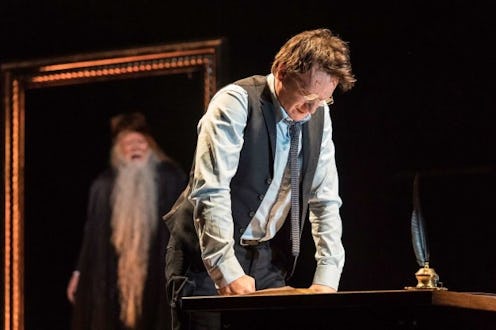
It's been a long time since we met any new characters in Harry Potter canon, so it makes sense that if J.K. Rowling and Jack Thorne were going to add one, they would think long and hard about what that character represented — which is why it is no accident that Delphi and Harry Potter are eerily alike. (Warning: Spoilers ahead for Harry Potter and the Cursed Child!). Yes, Delphi, the secret daughter of Bellatrix and Voldemort, served the essential function in the narrative as the villain we needed to spur the story along. But when you take a step back and really examine Delphi's purpose in the canon, she represents so, so much more than that.
On Harry's first day at Hogwarts, he is given a choice: to join Slytherin, and be great; or join Gryffindor, and be brave. In his childish mind Slytherin was "bad," so he deliberately chose the path that he thought was "good" by asking to be put in Gryffindor. It doesn't so much matter what the Houses really represent as it does what they represented in 11-year-old Harry's mind. Right then, for the first time, he is told to choose between evil and good — a theme that will continue throughout the seven years of his narrative, when time and time again, despite every temptation and despite his burdens and his past, Harry chooses the light.
The reason Delphi's story is similar to Harry Potter's is because she is Harry Potter. She was born to the same circumstances, faced with the same choices, and ultimately serves not just as Cursed Child's villain, but as a foil to the Harry That Might Have Been. To truly understand just how the writers intended this, let's delve into all the ways they are eerily alike:
Both Are, Of Course, Orphaned
This is the obvious parallel, but nonetheless an important one: from infancy they are both left on their own, with nobody else to serve as their compass, forced to rely on their own nature rather than the external influences of a nurturing guardian. They are both disconnected from the world in a way that very few people can understand, without any roots to anchor them or the comfort of unconditional love.
Both Are Sent To Live With People Who Resent Them
It is not hard to imagine that Delphi was raised by the Rowles family in a manner similar to which Harry was raised by the Dursleys; we see his hardships in flashback, and we understand hers implicitly when she says the Rowles only took her in for the mountains of gold that came with her. Not only were she and Harry both raised without love, but with active resentment from the people meant to take care of them.
Both Are Burdened With An Impossible Legacy From Their Parents
Lily and James represented so much to the people who fought in the First Wizarding Wars, and were every bit as revered as heroes as Voldemort was feared as a villain. There is a distinct sense in both of them that they have to live up to a standard of people they never truly knew, and live their lives to impress the very family that was never there for them — which ultimately is a deeply hollow kind of satisfaction.
Both Are Tied To Life-Altering Prophecies
The same way Harry finds out toward the end of his journey that he is tied to a prophecy that foretold the death of his parents and his involvement in something beyond his control, so did Delphi. It seemed, based on these prophecies, that they both had destinies to fulfill. But the play makes it every bit as clear as the books did — prophecies are flexible. They are not set in stone. What is more important than a prophecy is the choice that someone makes, demonstrating that we are, at least in the ways that it matters, in control of our own destinies. The prophesies themselves are less important that the very different manners in which Delphi and Harry handle them.
Both Have Distinguishing Marks That Set Them Apart
It is extremely fitting that it was Delphi's tattoo, her subtle allegiance to her father and her beliefs, that gave her away in the end. The same way Harry will forever be marked with his scar, she is also branded by a legacy she was born into that would forever color her view of the world.
Both Of Them Are, Essentially, Forced To Watch Their Parents Die
We know that Harry wants his parents back more than anything in the world; he sees them in the Mirror of Erised and comes night after night to pretend they're real. And we know that Delphi's ultimate mission in life is to resurrect her father, not just to bring him to power again, but to be an object of his pride.
And then we see the ultimate choice: when it comes down to it, Delphi will do anything to keep her father alive at the expense of everyone; and when it comes down to it, Harry will watch his parents die, letting it happen so that the rest of the world can be saved. We are deliberately set up with this parallel so that this climactic and devastating moment reveal the true nature of these characters, and the power of choice.
Harry Potter and the Cursed Child: Parts One & Two (Special Rehearsal Edition Script), $17.99, Amazon
Images: Courtesy of Harry Potter the Play